
Championship Manager 2006
Written by: Rik
Date posted: January 30, 2016
- Genre: Sport
- Developed by: Beautiful Game Studios
- Published by: Eidos Interactive
- Year released: 2006
- Our score: 6
The brief co-existence of two stat-heavy and visually-spartan football management series was the product of a falling out between former Championship Manager developers Sports Interactive and publishers Eidos. While details of the split were not publicised at the time, when they did finally emerge nothing was particularly surprising about what had transpired: SI basically wanted more credit for the success of the franchise (including an increase in royalties), while Eidos figured pretty much anyone could make Championship Manager. In this case, the ‘anyone’ was the newly-formed Beautiful Game Studios, who made a handful of CM games for Eidos before the publisher was swallowed by Square-Enix and the series was quietly retired. Meanwhile, SI went to Sega, who cheerfully offered them acceptable terms, and the partnership continues, with great success, to this day.
Whenever there’s a split of this nature, the logic of the publisher – who have the rights to a name – seems a little bemusing. With the exception of a few people that don’t follow gaming news, including perhaps a few confused parents, most people know who has made what, and they’re likely to trust the people who actually made the game that they love, rather than the people who work for the company that bought the name of the game that they love. In any case, the branding pretty much amounted to that name – which was conceived prior to the inaugural Premier League season and hence a time when the word ‘Championship’ conjured up images of winning the league title in the top division, rather than referring to the second tier of English football – and a photograph of a football on the front cover. Meanwhile, SI opted for a new, better, title – Football Manager – and a more relevant picture, of a football manager, for its cover (a callback, deliberate or otherwise, to the earliest days of Championship Manager, when a grey-haired Bobby Robson lookalike adorned the front of the box and the game’s title screen.)
Obviously, we know now which game came out on top, but I was nevertheless curious to find out exactly what happened to the CM series. Yes, the later games had been roundly dismissed as “not as good as Football Manager”, but I did wonder at the time whether the slightly unsavoury nature of the split meant that many were not kindly disposed towards the new CM from the start, having seen its developers separated from the product they created in a slightly messy way: for a time, Championship Manager was the MK Dons of the fake football management world (coincidentally, Sports Interactive have provided sponsorship for AFC Wimbledon, the team created from the mess of the original club’s relocation, since 2002). For example, Steve ‘PC Zone’ Hill reviewed CM 2006 for Eurogamer, and although I’m not suggesting any specific impropriety, he was known to be good friends with original Championship Manager creators Paul and Oliver ‘Ov’ Collyer, having met during Zone’s 90s heyday. But even if his conclusions weren’t entirely dispassionate, they were fairly typical of the general critical consensus, so perhaps I should just shut up and tell you what I think.
Unsurprisingly, CM 2006 is very similar to Championship Manager games of old. But it’s a curious mix of the familiar and an odd sense that some bits are missing, and it’s certainly a little lightweight in terms of features if we compare it to Football Manager 2006 (which we surely must, not just for all of the obvious reasons outlined above, but also because it was also the last football management game I played for any length of time). A few examples: media interaction is virtually non-existent, there are no pre-match or half-time team talks, and players don’t have preferred positions so you don’t know where a versatile player would particularly like to play, or who is the roundest square peg you can use in case of a tactical emergency. Individually, or even collectively, they’re hardly deal-breakers, but they were notable by their absence, adding to a general feeling of having gone back a little in time, even though the game was actually released several months later than FM 2006.
It could be argued that CM 2006’s match engine is slightly more advanced than that of the equivalent FM release, as a TV style camera is used and multiple angles are available. However, the players are still represented by pegs rather than anything that actually looks like a person, rendering claims of significant technical superiority a little hollow. I suppose they might have had a case if the action unfolded in a manner vaguely akin to a real match, but it’s all a bit of a pinball pantomime, and you learn little about your team from watching. In fact, the standard of play at times is frankly dreadful, with defenders frequently doing moronic things with clearances and back-passes, and goalkeepers letting shots through them like a hot knife through butter. To add to the feeling of mild farce, the sound effect that represents the ball hitting the back of the next sounds like ripping fabric, conjuring up images of your unfortunate keeper’s embarrassment at having let in a soft goal being compounded by an untimely wardrobe malfunction. (Incidentally, the sound is generally quite awful, with menu selections being accompanied by a strange apple crunching noise). In particular, goals from long range shots and misplaced crosses seem to be unusually common.
As the text commentary isn’t desperately useful, either, in terms of telling you what’s going on, you may as well ignore most of what’s happening, and hence you don’t feel that guilty about shoving the match speed up to high and letting events play out, as in the CM games of old, taking occasional note of the score and your players’ ratings (and indulging in mild swearing if necessary), only occasionally intervening for substitutions and tactical tinkering.
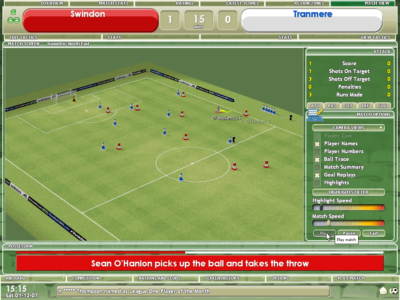
One problem with changing the default camera view is that doing so highlights the lack of stadia graphics. (Also it’s largely pointless).
Other features I considered moderately notable include the player attribute scores being out of 100 rather than 20 by default. Aside from this having a whiff of Spinal Tap about it, I’m not convinced it adds much, and I was relieved to discover you can change it back in the options menu (where it is dubbed the ‘traditional’ rather than the ‘modern’ setting – as if anyone with a preference for the old ways of marks out of 20 was some kind of Ron Manager long-ball dinosaur bemused by all of the amazing technical innovations brought in by new-fangled foreign coaches). The board also blocked a number of my transfer deals and contract offers, even when I offered terms within the parameters they initially deemed acceptable on the offer screen. In my case there were no significant ramifications: one deal was a marginal decision to offer a youth player a new contract, while a punt on a full back from the lower leagues was also cancelled. It’s good to see board interference being included, as I imagine this is a significant consideration in real life (although I don’t recall it being one in FM 2006), but it can also be frustrating, as there’s no way to challenge the decision other than tinkering with the terms in a vain attempt to sneak through a deal.
There’s also a lot more potential for talking to your players, although not necessarily in the traditional form of a news item announcing that player x is unhappy, wants a transfer and is demanding an immediate response. However, if you access individual player profiles, you’ll be able to see a list of their current concerns and you can initiate a talk at that stage in an attempt to address them (via a multiple choice list of options, which doesn’t always include anything useful). Again, this is a nice touch, although at various points I supposedly had a significant number of unhappy players in the squad without it seeming to affect performance too much.
As CM 2006 is still recognisably Championship Manager, it’s fairly easy to get into for anyone with prior knowledge of the series, and it’s certainly not unenjoyable. The same staples of rebuilding a squad and taking your side to promotion still appeal, and the transfer market is a bit more forgiving than in FM 2006, with the free transfer options being particularly fruitful: I managed to bring in a number of handy Italians, although my best signing was when I persuaded ex-Spain winger Javier de Pedro to come and see out his twilight years in Swindon. (You do have to vet most potential signings if they’re hitherto unknown, though, as attribute masking – meaning that you can’t see an unknown player’s stats until a scout has delivered their report – is in effect). Your ability to quickly reshape your team is also aided by the fact that other clubs seem remarkably keen to put in bids for your unwanted players. Those who preferred the odds-firmly-in-your-favour approach of early CM titles will appreciate this: ok, it’s perhaps unrealistic, but in a way that you sort of don’t mind.
There are glitches, aside from the ones we’ve already mentioned. Defenders and ‘keepers always seem to get low ratings (particularly ‘keepers, which bearing in mind their frequently inept performances, are often deserved, but all of them seem to be equally bad, regardless of their stats). On the transfer side, free signings have rather too modest wage demands: I understand they’re out of work, but 100 quid a week isn’t much for a professional footballer. I also found, to my dismay, that a couple of signings from non-league Forest Green Rovers were not in fact a credit to my club’s scouting network and my own ability to spot a useful player but actually part of a known glitch with players from that particular team – I did think it was a bit weird that no one ever tried to buy them, and their values never went up (the ‘Forest Green’ bug is one of the few bits of information currently included on the game’s Wikipedia page, along with the fact that, apparently, the game doesn’t allow you to become an international manager – something I wouldn’t have noted as it’s not something I’ve ever considered in all my years playing CM/FM games).
As in FM 2006, you also have a contract of your own, although there doesn’t seem to be an option to renegotiate your initial five year deal: I know it’s not real money, but to be getting £700 a week when rival managers like Joe Royle in the same division were getting £10,000 a week was slightly annoying. Finally (and I mention this not to be critical of this game in particular, as I know unusual happenings have been a feature of past and future CM and FM games) I did notice that Aston Villa had won the 2009 Premiership title, with Kevin Blackwell as their manager and Milan “offside!” Baros their leading scorer.
Despite the various quirks and omissions, plenty of the old magic remains: you get lost in the world, telling yourself you need to play just one more match, or stay up a little bit later to narrow down your transfer targets. I certainly played for longer than was expecting to (and longer than I would have needed to in order to come up with largely similar conclusions) although I must stress that four or five seasons isn’t really very much in FM/CM land. (The real-life time commitment is still significant though). I took particular note of the fact that I considered one transfer window too important to conduct during my weekday commute, where I might not be able to give it my full attention, as a sign I was rather getting into it.
Overall evaluation is a little tricky. On the one hand, I’d say CM 2006 was probably one of the more enjoyable management games, other than SI’s CM and FM, that I’d played, and there’s an argument that the slightly lightweight structure may actually be preferable for someone seeking a less intensive managerial workload. Except, of course, everything good about this game has come from a template developed by another studio, who have since gone on to produce an altogether superior product, while the lighter experience is not a deliberate design choice, but is instead a sign of a developer playing catch-up. Such things were rather more important when the two games were in a head-to-head chart battle at £30 apiece, but I guess the same conclusions remain: it’s certainly not bad, but FM is significantly better. If you want a game that’s more like the old CM, going back to the one you liked/remember best will probably still represent a more coherent experience than this, which is probably one only for those (like me) curious about the slow fizzling-out of a once-great series.

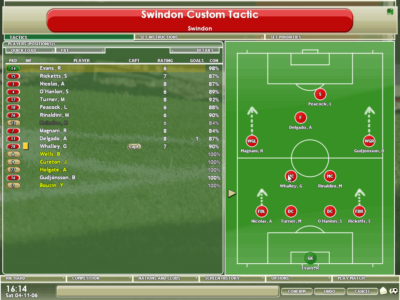
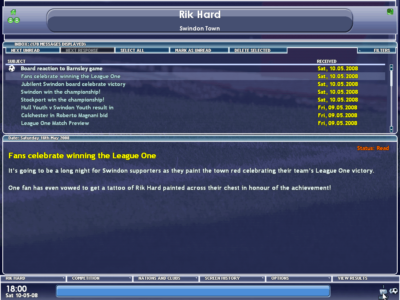
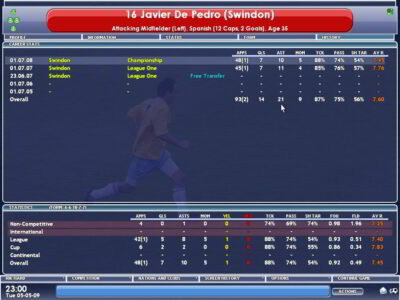
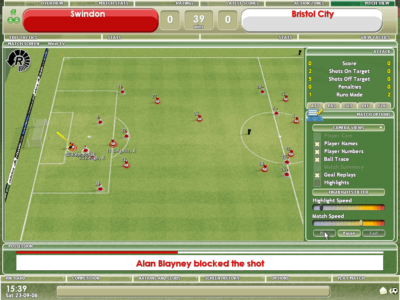

 Posts
Posts